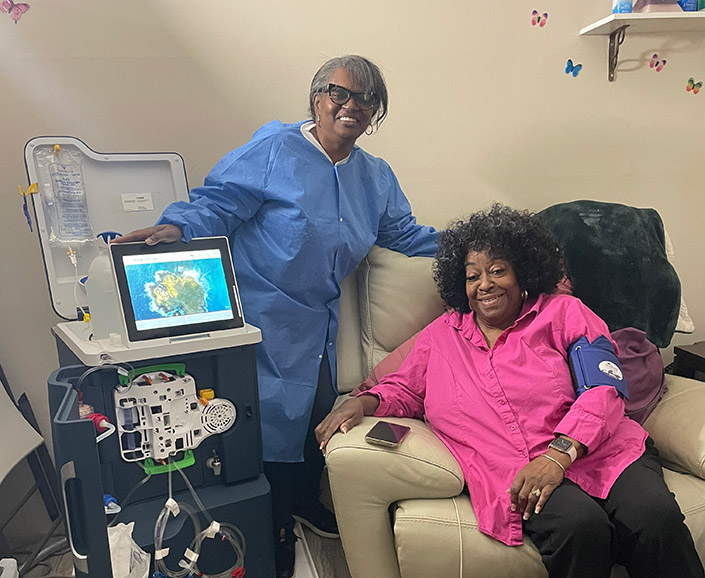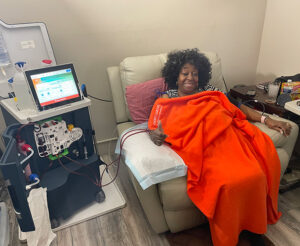Regina: Positive, Independent and Thankful on Home Dialysis

Summary
Having faced many challenges along her kidney disease journey, Regina now enjoys activities she loves while managing her hemodialysis at home with Tablo.
Regina, who lives in Southfield, a suburb north of Detroit, MI, has had kidney disease most of her life. Although having endured many health challenges, she lives by an inspirational saying that she has displayed on the wall in her home: “Life isn’t about waiting for the storm to pass. It’s about learning to dance in the rain.”
Pictured on the right in the image above, along with her home nurse, care partner and friend Monique, Regina stays very active, and is known for her positive attitude. She just celebrated her 69th birthday, with the energy and enthusiasm of someone 20 years younger.
Her journey began at 14, when she was admitted to the hospital with a kidney infection. She discovered that she had one small, malformed kidney and one normal-sized kidney. Then in her 40s, her primary doctor found protein in her urine (proteinuria)—often a sign of kidney disease. But they didn’t refer her to a nephrologist at that time. A few years later, in 2014, her urine started appearing bubbly, another sign of kidney damage. After running some tests, her doctor told her that her kidney function was about 50% (below 15% of normal is considered kidney failure). But, she wasn’t feeling sick.
At a check-up the following year, her doctor gave her shocking news: she was going to need to go on dialysis by the end of the year. Regina was in denial that her kidneys were failing, as she had had no serious symptoms.
“I thought she was crazy. I was angry, so I stopped seeing that doctor and went on with my life,” she says. “But then I got sicker and sicker. I would become short of breath and not know why.”
She continued her active lifestyle, working and traveling as part of her job with a healthcare company, as well as side businesses including fostering handicapped children. She didn’t realize that her kidney function was deteriorating and causing shortness of breath, fatigue, weakness and other symptoms.
Later that year, she met with another nephrologist and they discussed treatment options, as she finally understood that the need for dialysis was quickly approaching. She chose peritoneal dialysis (PD) because she could continue to work and change her fluid while on the go.
However, during the November 2015 procedure to implant her PD catheter there were complications, and her intestine was punctured. She spent a challenging 19 days in the hospital, one week of that with a breathing tube in her airway. She also had a catheter placed in her chest so hemodialysis could be performed.
The doctors offered to redo her PD catheter procedure, but she refused. PD was now out of the question. She was angry, and didn’t want to hear what any of them had to say.
Once discharged, Regina’s doctor placed her into in-clinic dialysis three days a week. She also had an arteriovenous (AV) fistula placed in her arm, which later had to be replaced with a graft due to complications.
Life as she knew it had taken an abrupt turn, as she had to stop doing what she loved—working and traveling. “To have to sit down, as I am always active, mentally that was tough. But I told myself, Regina, this is happening, you’re going on dialysis, you can’t change it so deal with it,” she says.
About two years later, Regina found a nephrologist at Henry Ford Health who she really got along with, Hassan Fehmi, MD. “He’s different from other kidney doctors I had seen. He has a lot of compassion, and really cares about what is going on with me,” says Regina.
During a monthly check-up while she was treating in-center, Dr. Fehmi said to her, “If I had to be on dialysis, I would consider doing home dialysis.”
One day in 2018 during a monthly check-up while she was treating in-center, Dr. Fehmi said to her, “If I had to be on dialysis, I would consider doing home dialysis.”
Not knowing anything about it, Regina replied, “Well, that’s you. I’m comfortable here with my own remote, and my heated seat. I stick my arm out, I get my treatment and I’m gone.”
But she started thinking about the option of home dialysis, as her doctor mentioned it at every appointment. Then one night, she had so much fluid in her body she was having trouble breathing, and she called 911. “That was a scary experience, and it comes from not knowing everything about my kidney disease. Had I known, I would have limited my fluid intake,” she says.
After she got out of the hospital, she told Dr. Fehmi that she was ready to try home hemodialysis, and take better care of her kidney disease. He asked if she had a care partner, and her sister was willing as she was living at Regina’s home. Regina spent five weeks training on the NxStage system at his office.
“I was fearful at first because I used to have the support of my doctor’s nurses, and the instruction manuals were overwhelming,” she continues. “The supplies took over the garage and three of my closets. And we were always having to call them, when things went wrong with the machine.”
Then, her sister moved out and Regina hired a tech to help her with treatments, including cannulation. She also had her regular-sized kidney removed due to cancer, and so was left with only the small, malformed kidney. She also found out she was not a candidate for a kidney transplant, due to issues with her vascular system.
“I told myself, you’ve got to make the best of your dialysis, as you’re going to be on it the rest of your life. My attitude was to stay positive,” she says.
In September 2020, she was at her nephrologist’s office at Western Regional Home Dialysis, and a clinical representative from Outset Medical, Caroline Maicki, RN, BSN, wheeled in a compact Tablo Hemodialysis System, that the center was going to use to train patients to do home dialysis. (See this recent story about the successful Tablo home dialysis program that the center has now established.)
Regina saw the device and asked Caroline, “What is that? Let me take a look.” She started talking with Caroline and her nurse, and learned that Tablo was easy for home patients to learn and use, with step-by-step, animated touchscreen instructions. It incorporates integrated water purification and on-demand dialysate production, so no need to make and hang heavy bags of dialysate fluid, and minimal supplies to store. Her doctor would have real-time access to her treatment data via automated cloud-based system monitoring, patient analytics and clinical recordkeeping.
Her nurse asked her, “how would you like to work on this machine?”
“Absolutely, I’ll try it,” Regina said, and soon after she began her brief training on Tablo. Her first home treatment was performed smoothly and successfully on Thanksgiving Day, November 26, 2020.
Since going home with Tablo a year and half ago, Regina says that she has more free time, and she feels better.
 She then told her nephrologist, “I don’t ever want to see that NxStage machine again, period. I think if I ever had to do NxStage again I wouldn’t do it. I’d go into a center.”
She then told her nephrologist, “I don’t ever want to see that NxStage machine again, period. I think if I ever had to do NxStage again I wouldn’t do it. I’d go into a center.”
Since going home with Tablo a year and half ago, Regina says that she has more free time, and she feels better. She treats for two and a half hours, four days a week. As she’s not one to sit idle, she spends a lot of her time assisting her son with his successful trucking business (she also has two daughters who live in Atlanta), and other projects. She also enjoys cooking for her family and friends.
“If I have plans during the day, I schedule my treatment for 6:30 in the morning. I can do my treatment and go on and do my thing. You have that flexibility,” she says.
Caroline also introduced her to a nurse who is now her home dialysis care partner and good friend, Monique. A 25-year acute dialysis nurse, Monique loves helping patients do well on dialysis. She lives near Regina, and offered to help her with treatments. “I believe you always have to be positive for the patient, listen to them and empathize,” says Monique. “I teach them that they have to be proactive and accountable in their care.”
Monique has been treating patients on Tablo for several years, and has used many other machines during her career. “My favorite is Tablo. It is so much easier to use. It is small and easy to push, and convenient to use bedside in the hospital, and at Regina’s home,” she says.
In thinking about her kidney disease journey, Regina says that she has a lot to be thankful for, and her positivity has kept her going. “I’ve got my doctors in place, I’ve got my Tablo machine and Monique to help me, I’m living the life. Your health is everything. That’s your wealth.”
* Tablo Hemodialysis System Disclaimer:
Results may vary. Keep in mind that all treatment and outcome results are specific to the individual patient. Please consult your physician for a complete list of indications, warnings, precautions, adverse events, clinical results, and other important medical information. It is important that you discuss the potential risks, complications, and benefits of this product with your doctor prior to receiving treatment, and that you rely on your physician’s judgment. Only your doctor can determine whether you are a suitable candidate for this treatment.

